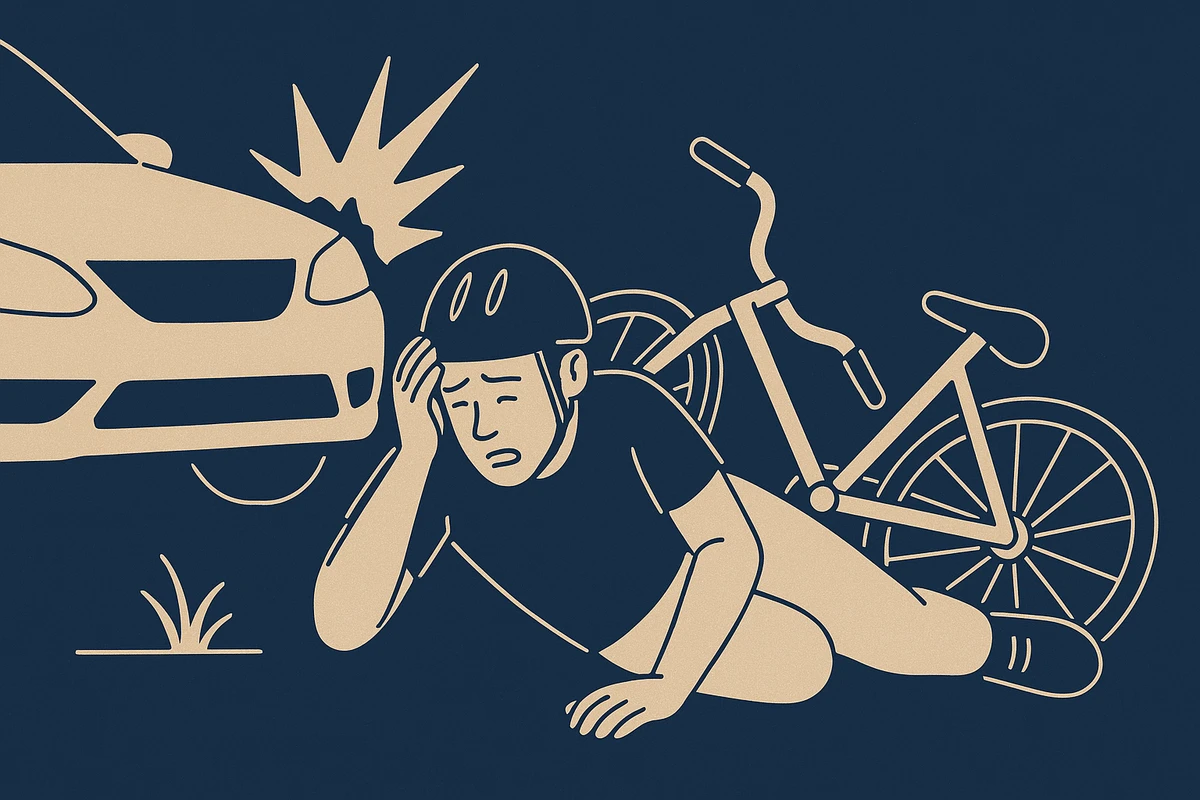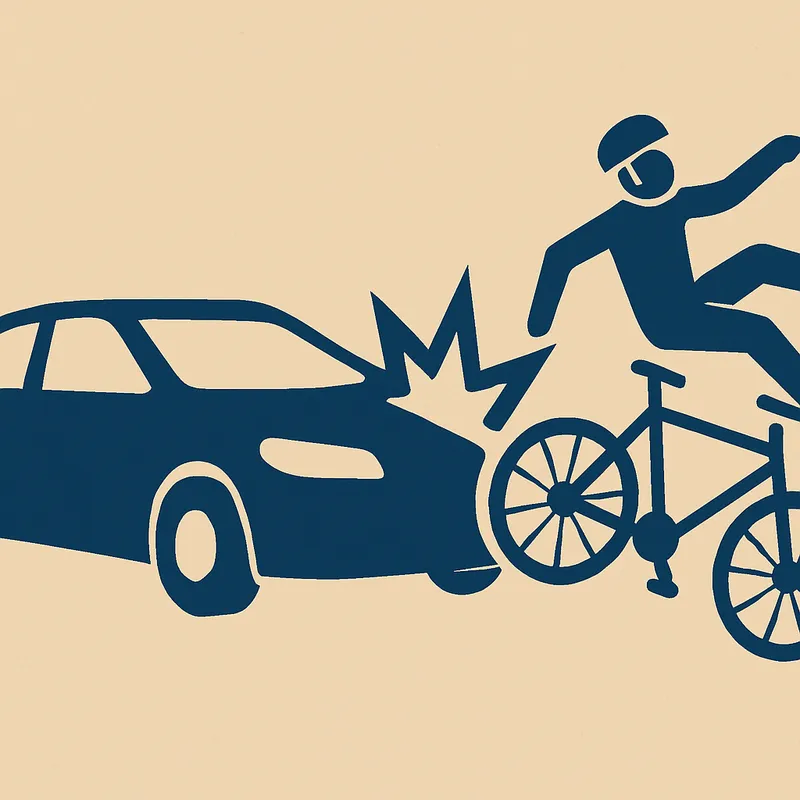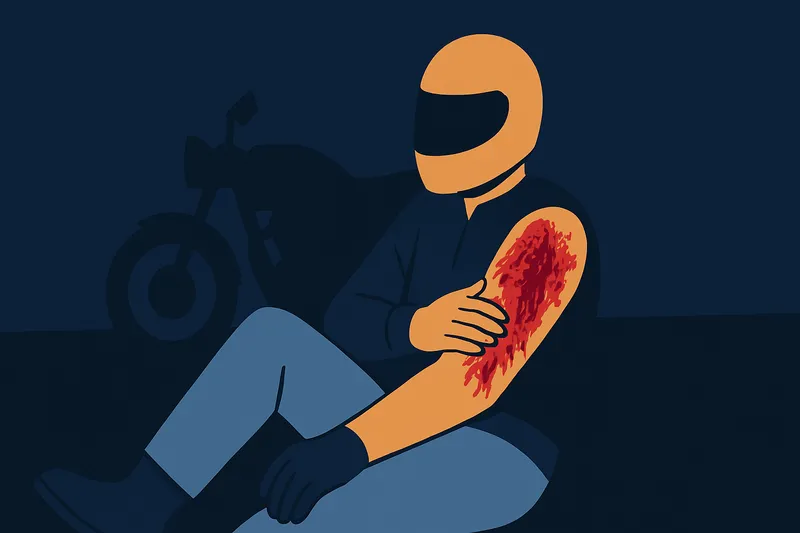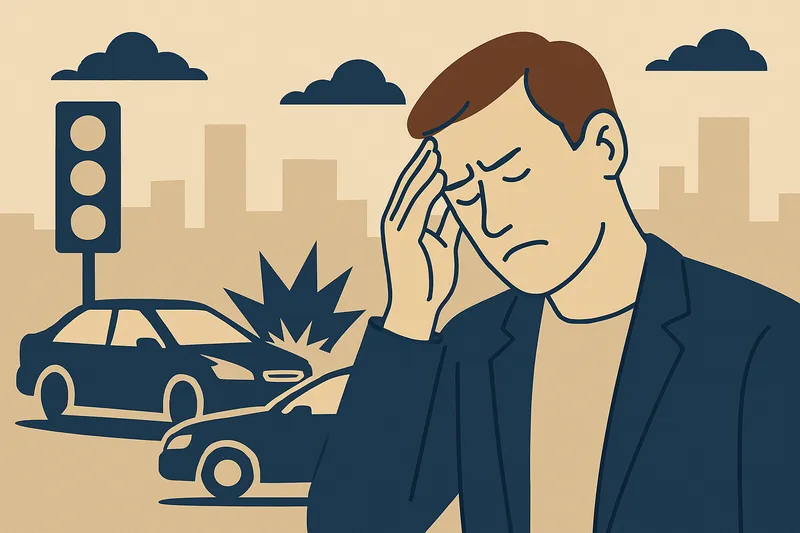What Injured Bicyclists in Georgia Should Do After Being Hit by a Car

Published: 3/24/2025
Being hit by a car while cycling is a frightening experience. Learn the specific steps Georgia bicyclists should take to protect their health and legal rights after an accident.
Immediate Steps to Take at the Accident Scene
Being hit by a car while cycling is a frightening experience. It’s important to stay calm and take specific steps to protect your health and legal rights. Georgia has particular laws and procedures for traffic accidents, including those involving bicycles.
Ensure Your Safety and Check for Injuries
Your first priority is safety. If you’re able, move out of the roadway to avoid further danger. Check yourself and others for injuries. If you or anyone else is hurt, avoid unnecessary movement (which could worsen injuries) and call for medical help right away. Even if injuries aren’t obvious at first, remember that shock can mask pain and some injuries may become apparent later.
Call 911 to Get Police and Medical Help
In Georgia, you should always call 911 after an accident involving a bicycle and a motor vehicle. This will summon police and, if needed, emergency medical responders. Georgia law requires that any accident involving injury, death, or property damage over $500 be reported to law enforcement immediately. By calling 911, you ensure the accident is documented in an official police report, which will be crucial for any insurance claim or legal action.
Tell the dispatcher your location and report any injuries so they can send an ambulance if necessary.
Wait for Police and Do Not Leave the Scene
Stay at the scene until officers arrive. It is illegal in Georgia to leave the scene of an injury accident. When police arrive, they will secure the area and begin creating an accident report. Cooperate with the responding officers and provide a factual account of what happened.
Important: Do not admit fault or apologize for the accident – simply explain the facts from your perspective. Make sure the police officer files an accident report before you leave. If an officer is reluctant to make a report (sometimes if injuries seem minor), politely insist on it being filed; you may be in shock and injuries could surface later.
Provide and Get Necessary Information
Exchange information with the driver who hit you, as required by Georgia law. The Georgia Driver’s Manual instructs all parties in a crash to give their name, address, and driver’s license number and to share vehicle registration (license plate) and insurance details.
Write down or photograph:
- Driver’s name, phone number, and address
- Driver’s license number
- License plate number
- Insurance company and policy number
Likewise, provide your contact information to the driver and police. This exchange of information is not only courteous – it’s mandated in Georgia and will be needed for filing insurance claims.
Speak with Witnesses
If anyone saw the accident happen, try to get their contact information. Eyewitness accounts can be extremely valuable later. Ask witnesses politely for their names and phone numbers, and if they are willing, a brief description of what they saw. Jot down their observations if possible.
According to Georgia law enforcement procedures, officers on scene may also identify witnesses, but it’s wise to have your own record. Witness statements can help corroborate your version of events if there is a dispute about what happened.
Document the Scene
If you are not too injured, or ask someone else if possible, gather evidence at the accident scene. Use your phone to take pictures of everything relevant:
- Your bicycle damage
- The car and its damage
- The road conditions
- Skid marks
- Traffic signs
- Your visible injuries
Take photos from multiple angles and distances. Also note the exact location, time, and weather. These photos and details can later help piece together how the crash occurred. If you have a cycling computer or GPS, save the data from your ride as it could show your speed or path.
Get Medical Attention and Keep Records
Bicycle accidents often result in serious injuries, so getting prompt medical evaluation is critical. Even if you received medical care from paramedics at the scene, follow up with a doctor as soon as you can – ideally the same day or next day. Adrenaline can mask pain, and injuries like concussions or internal injuries might not show symptoms immediately.
When you see a doctor, explain that you were in a bicycle accident so they note it in your records. Be thorough in describing all your pains and problems, no matter how minor. This creates an official record linking your injuries to the accident, which is crucial for any claim.
Document your medical treatment and related expenses by keeping:
- Copies of hospital bills
- Doctor invoices
- Prescriptions
- Physical therapy referrals
- Any other medical costs
Also maintain a journal of your symptoms and recovery. For example, note days you experience pain, missed work, or activities you can’t do because of your injuries. Photographs of visible injuries (bruises, cuts, casts, etc.) over time are useful – take them in the days and weeks after the crash, since some injuries (like bruising or swelling) evolve.
Don’t Admit Fault or Make Unnecessary Statements
In the immediate aftermath, be very careful about what you say. Do not admit fault for the accident, even if you think you might have been partly to blame. Emotions run high after a crash, and it’s natural to be shaken and even say “I’m sorry” reflexively – but saying that can be interpreted as admitting legal liability.
Georgia is a comparative negligence state, so fault can be complex. It’s best not to accept blame or accuse the driver at the scene. Simply stick to the facts when talking to police or others: describe what happened objectively without saying it was your fault.
Be cautious when speaking to insurance companies after the accident. You will likely get a call from the driver’s auto insurance company, and they may even ask for a recorded statement. It’s usually wise not to give a recorded statement or sign anything for the other driver’s insurer until you have legal advice.
On the other hand, if you have your own auto insurance (or homeowner’s insurance), you should notify your insurer about the accident fairly soon. Many policies require prompt notification of any accidents. When talking to your own insurer, be truthful but stick to facts and don’t speculate on fault.
Gather and Preserve Evidence for Your Claim
Building a strong case later will depend on the evidence you preserve now. After the accident, make sure to obtain a copy of the police accident report once it’s available (usually within a few days). You can request it from the law enforcement agency that responded.
Keep all physical evidence as well. Do not throw away or repair your damaged bicycle and gear until the claim is resolved. Your smashed helmet, broken bike, torn clothing, and any other damaged items should be retained as they can serve as evidence of the force of impact and injuries.
Additionally, save any correspondence related to the accident – for example, emails or texts from the driver or witnesses, or medical reports from doctors.
Know Your Rights Under Georgia Law
Georgia law offers protections and rights for bicyclists who are injured by negligent drivers. It’s important to understand these key legal points:
Right to Use the Road
Bicyclists in Georgia have the same rights to the road as motorists. In fact, Georgia law considers bicycles as vehicles, and cyclists must generally follow the same traffic laws as cars. This also means drivers must respect a cyclist’s right to be on the roadway.
For example, cyclists are legally entitled to use the full travel lane when needed (they are not required to always hug the curb or be in a bike lane). If a driver hit you simply because you were “in the way,” the law is on your side – you had every right to be there, and the driver had a duty to share the road safely.
Driver’s Duty of Care to Bicyclists
Georgia drivers are required to exercise due care to avoid collisions with cyclists. State law specifically requires motorists to give bicyclists adequate space when passing. Georgia’s “Three-Foot Law” (O.C.G.A. § 40-6-56) says that if a driver can’t fully change lanes to pass, they must slow down and leave at least a three-foot clearance when overtaking a bicycle.
Drivers should also not drive aggressively around cyclists or encroach on marked bike lanes. If the driver who hit you violated any of these rules – for instance, by passing too closely or driving recklessly – it can establish their negligence per Georgia law.
Comparative Negligence (Shared Fault)
Georgia follows a modified comparative negligence rule. This means if you were partially at fault for the accident, you can still recover damages as long as you were less than 50% at fault. However, any compensation you receive would be reduced by your percentage of fault.
For example, if you were found 20% at fault (perhaps for not having a light at night), your award would be reduced by 20%. Importantly, if a jury (or insurance adjuster) decides you were 50% or more to blame, you would be barred from recovering anything.
This is why it’s crucial not to prematurely admit fault – fault is a complex determination. Even if you suspect you were a little bit responsible, under Georgia law you might still recover a significant portion of your damages if the driver was more at fault.
Statute of Limitations
Georgia law places a time limit on how long you have to file a personal injury lawsuit. In most cases, an injured bicyclist has two years from the date of the accident to file a lawsuit for injury-related damages. This deadline is known as the statute of limitations.
If you miss the two-year window, you will likely lose your right to bring a claim in court for your injuries. It’s best not to delay taking action. Even though two years sounds like plenty of time, the sooner you start the claims process, the fresher the evidence and witness memories will be.
Additional Georgia Rules
If you were not wearing a helmet at the time of the crash, you should know that Georgia law requires bicycle helmets only for riders age 16 and under (adult cyclists are not legally required to wear a helmet). Not wearing a helmet does not prohibit an adult cyclist from recovering damages. However, expect the driver’s insurer to argue that a helmet would have reduced your injuries if you had a head injury. Georgia courts might allow such arguments under comparative negligence, but since there’s no legal requirement for adults, it’s a weaker defense. Regardless, wearing a helmet is always advisable for safety.
Georgia’s “Hit and Run” law (O.C.G.A. § 40-6-270) makes it a crime for a driver to leave the scene of an accident involving injury. If you were the victim of a hit-and-run, report it to the police immediately. Even if the driver isn’t caught, you may pursue a claim through your own uninsured motorist coverage.
The Role of a Personal Injury Attorney
After addressing your immediate health and safety, contacting a personal injury attorney is one of the most important steps you can take. An experienced bicycle accident lawyer will protect your rights and help you navigate the aftermath of the accident.
Legal Guidance and Case Evaluation
A lawyer can evaluate the facts of your accident and explain what options you have. Most personal injury attorneys offer a free initial consultation, so you can discuss your situation at no cost. They will advise you on the strength of your case, potential compensation, and the next steps.
Handling Communication
Once you have an attorney, they can handle all communications with insurance companies on your behalf. This means you won’t have to worry about saying the “wrong” thing to an adjuster – your lawyer will speak for you. Insurance companies are more likely to take your claim seriously if you have legal representation.
Investigation and Evidence Gathering
Personal injury lawyers and their teams can investigate the accident thoroughly. They may revisit the scene, obtain traffic camera footage, interview witnesses, and consult accident reconstruction experts if needed. They know what evidence is necessary to prove negligence.
Evaluating Damages
A key role of your lawyer is to calculate all of your damages – not just your current medical bills, but future medical costs, lost income, pain and suffering, property damage to your bicycle, and any long-term impacts on your life.
Georgia law allows recovery for both economic losses (like bills and wages) and non-economic losses (like physical pain and mental anguish). An attorney ensures none of these are overlooked when negotiating with the insurer or presenting your case.
Negotiation and Litigation
Your attorney will formally file claims with the insurance companies and enter into negotiations. They will use the evidence gathered to demand appropriate compensation. If the insurance company refuses to offer a fair settlement, your attorney can file a lawsuit on your behalf.
Hiring a lawyer may seem daunting, but for personal injury cases, you typically don’t pay anything upfront. Almost all bicycle accident attorneys work on a contingency fee – meaning they only get paid if you win a settlement or judgment.
Georgia’s Deadlines and Next Steps
In summary, after a bicycle accident in Georgia caused by a motorist, take these steps:
- Get to safety
- Call 911 and get a police report
- Exchange information
- Gather evidence
- Seek medical care
Don’t admit fault or downplay your injuries. Notify your insurance and be cautious with the at-fault driver’s insurer. It’s wise to consult a Georgia personal injury attorney early – they will help you navigate insurance pitfalls and work to get you the compensation you need to recover.
Remember the statute of limitations is two years for personal injury in Georgia, so while healing is your first priority, you should not wait too long to pursue your claim. Being injured in a bicycle accident is traumatic, but Georgia law is there to protect victims. You have the right to seek compensation for your medical bills, bicycle damage, lost income, and pain and suffering from the driver who hit you.
Related Articles



